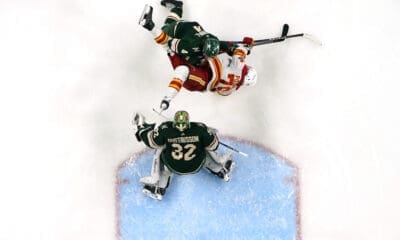Calgary Flames
The Flames’ Hardest Hitters for 2009-10

A few days ago, I talked about the Flames‘ supposed identity, how a part of that was toughness and physical play, specifically hitting, and how they finished in the bottom half of the league in total hits. The merits of tracking real time stats like hits have long been debated due to league-wide discrepancies in what fits the criteria associated with hits, giveaways, blocked shots, and takeaways; The Flames were first in the league in road hits with 1038 and second last at home with 670, ahead of only Vancouver and Atlanta, and home scorers are typically more generous when crediting the local squad with board-rattling body checks. Adam Pardy was on the receiving end of more hits than he gave out both at home and on the road, while Mark Giordano dished out more hits on the road, but also took more. A quick glance at the NHL’s real-time stats page will tell you that, contrary to the beliefs of some general managers, physical play is not always synonymous with success. Five of the top ten hitting teams in the league this season missed the playoffs, while seven of the ten teams ranked below the Flames in that category made the post season. Both Gabe of Behind The Net fame and, more recently, Bruce from The Copper & Blue have examined hitting in-depth, and I thought I’d take a look at who the most physical Flames were this past season.
| Name | GP | Hits | Hits/GP | TkA |
| Mark Giordano | 82 | 153 | 1.87 | 33 |
| Robyn Regehr | 81 | 125 | 1.54 | 18 |
| Cory Sarich | 57 | 116 | 2.04 | 6 |
| Jay Bouwmeester | 82 | 73 | 0.89 | 24 |
| Ian White | 83 | 54 | 0.65 | 35 |
| Adam Pardy | 57 | 54 | 0.95 | 16 |
| Steve Staios | 58 | 54 | 0.93 | 12 |
The heavy hitters on the Flames blueline were as expected, although I was somewhat surprised to see Gio at the top of the list in hits. Sarich's Hits/GP rate likely would have evened out had he played a whole season, but is pretty impressive nonetheless, given how far above any other Flames defender he is by that metric. The fact that he only played 57 games somewhat speaks to his willingness to get involved in the physical side of things, although I believe most of his injuries have been sustained from shot-blocking. I also included takeaways (TkA) in my table because I wanted to see if there was any connection between guys who hit a lot, therefore separating an opposing player from the puck, and takeaways. It turned out there really isn't a pattern, aside from that the guys usually considered more agile, "puck moving defencemen" like Giordano, White, and Bouwmeester all had the most takeaways.
| Name | GP | Hits | Hits/GP | TkA |
| Christopher Higgins | 67 | 130 | 1.94 | 44 |
| Eric Nystrom | 82 | 117 | 1.43 | 35 |
| Ales Kotalik | 71 | 117 | 1.65 | 22 |
| Rene Bourque | 73 | 91 | 1.25 | 47 |
| Jarome Iginla | 82 | 86 | 1.05 | 45 |
| Daymond Langkow | 72 | 80 | 1.11 | 63 |
| David Moss | 64 | 79 | 1.23 | 21 |
| Curtis Glencross | 67 | 78 | 1.16 | 50 |
| Matt Stajan | 82 | 77 | 0.94 | 40 |
| Jamal Mayers | 71 | 69 | 0.97 | 21 |
| Nigel Dawes | 66 | 66 | 1 | 14 |
| Craig Conroy | 63 | 43 | 0.68 | 26 |
| Niklas Hagman | 82 | 35 | 0.43 | 28 |
| Brian McGrattan | 34 | 16 | 0.47 | 2 |
The hitting trends for Flames forwards were a little different than I anticipated. I expected Nystrom and Bourque to be near the top, but I wouldn't have thought that Higgins would lead all forwards in hits. It's likely that only a small percentage of those came when he was with the Flames, considering he only played twelve games for Calgary this season, but it's just another indication that he's a pretty good player. For a guy that's often criticized for being "soft," I expected Stajan to have fewer hits and I was pleasantly surprised to see Kotalik near the top of the list as well, although that does little to change my opinion of him. With the forwards, the connection between hits and takeaways is a little more visible, but still not significant.
Not every player chooses or is able to play a more physical game, which arguably makes hitting something of a skill, and something that is valued and emphasized by some coaches and organizations more than others. The importance of these numbers depends on your perception of how much hitting actually influences the various events during a game. If you believe it has a big impact on a game, you might be underwhelmed, but if you believe it has little impact, you might consider these numbers to be fairly unimportant. Myself, I'm somewhere in the middle. I think hitting does have an impact on a game, as we saw with the Flames on many occasions this past season when their physical play allowed them to gain the edge in possession and draw more penalties and vice versa when they were getting out-hit by the opposition. However, it's not the be all and end all, and it's certainly not going to be primary cause of one team scoring more goals and/or winning more games than another. What do you think?
by Hayley Mutch








